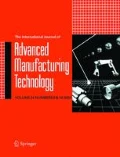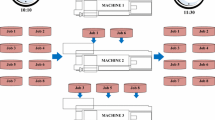Abstract
This paper addresses an n-job, single-machine scheduling problem with an objective to minimize flow-time variance, a non-regular performance measure. A spreadsheet-based genetic algorithm (GA) approach is presented to solve the problem. A domain-independent general-purpose GA is used, which is an add-in to the spreadsheet software. The paper demonstrates an adaptation of the proprietary GA software to the problem of variance minimization. To test the performance of the proposed approach, test problems are taken from already published literature. The proposed approach is found to perform better than the previous GA, simulated annealing (SA) and Tabu search (TS) approaches for variance minimization in that it produces an optimal solution for all the test problems. Empirical analysis was carried out to study the effect of GA parameters, namely, the crossover rate, mutation rate, and population size.
Similar content being viewed by others
References
Merten AG, Muller ME (1972) Variance minimization in single-machine sequencing problem. Manage Sci 18:518–528
Eilon S, Chowdhuary IC (1977) Minimizing the waiting time variance in the single-machine problem. Manage Sci 23:567–575
Kanet JJ (1981) Minimizing variation of flow times in single-machine systems. Manage Sci 27:1453–1459
Vani V, Raghvachari M (1987) Deterministic and random single machine with variance minimization. Oper Res 35:111–120
Gupta MC, Gupta YP, Bector CR (1990) Minimizing the flow-time variance in single-machine systems. J Oper Res Soc 41:767–779
Mittenthal J, Ragavachari M, Rana AI (1993) A hybrid simulated annealing approach for single-machine scheduling problem with non-regular penalty functions. Comput Ind Eng 20:130–131
Gupta MC, Gupta YP, Kumar A (1993) Minimizing the flow-time variance in a single-machine system using genetic algorithms. Eur J Oper Res 70:289–303
Kubiak W (1993) Completion time variance minimization on a single machine is difficult. Oper Res Lett 14:49–59
Ventura J, Weng MX (1995) Minimizing single-machine completion time variance. Manage Sci 41:1448–1455
Manna DK, Prasad VR (1999) Bounds for the position of the smallest job in completion time variance minimization. Eur J Oper Res 114:411–419
Al-Turki U, Fedjiki C, Andijani A (2001) Tabu search for a class of single-machine scheduling problems. Comput Ind Eng 28:1223–1230
Viswanathkumar G, Srinivasan G (2003) A branch-and-bound algorithm to minimize completion time variance on a single processor. Comput Oper Res 30:1135–1150
Sharma P (2002) Permutation polyhedra and minimisation of the variance of completion times on a single machine. J Heurist 8(4):467–485
Ng CT, Cai X, Cheng TCE, Lam SS (2005) Minimizing completion time variance with compressible processing times. J Glob Optim 31(2):333–352
Goldberg DE (1989) Genetic algorithms in search, optimization and machine learning. Addison-Wesley Publishing Company, New York
Davis L (1985) Job shop scheduling with genetic algorithms. In: Proceedings of the 1st International Conference on Genetic Algorithms, Lawrence Erlbaum
Jeong SJ, Lim, SJ, Kim, KS (2006) Hybrid approach to production scheduling using genetic algorithm and simulation. Int J Adv Manuf Technol 28:1–2
Chou F-D (2006) A joint GA+DP approach for single burn-in oven scheduling problems with makespan criterion. Int J Adv Manuf Technol 27:15–24
Liu, T-K, Tsai, J-T, Chou J-H (2006) Improved genetic algorithm for the job-shop scheduling problem. Int J Adv Manuf Technol 27(9–10):1021-1029
Malve S, Uzsoy R (2007) A genetic algorithm for minimizing maximum lateness on parallel identical batch processing machines with dynamic job arrivals and incompatible job families. Comput Oper Res 34(10):3016–3028
Ho NB, Tay JC, La, E M-K (2007) An effective architecture for learning and evolving flexible job-shop schedules. Eur J Oper Res 179(2):316–333
Haral U, Chen Jr R-W, Ferrell WG, Kurz MB (2007) Multiobjective single-machine scheduling with nontraditional requirements. Int J Prod Econ 106(2):574–584
Essafi I, Mati Y, Dauzère-Pérès S (2007) A genetic local search algorithm for minimizing total weighted tardiness in the job-shop scheduling problem. Compute Oper Res (in press), Corrected Proof, Available online 16 February 2007
Shiau D-F, Cheng S-C, Huang Y-M (2007) Proportionate flexible flow shop scheduling via a hybrid constructive genetic algorithm. Exp Sys Appl (in press), Corrected Proof, Available online 10 January 2007
Martin CH (2006) A hybrid genetic algorithm/mathematical programming approach to the multi-family flowshop scheduling problem with lot streaming. Omega (in press), Corrected Proof, Available online 26 December 2006
Marimuthu S, Ponnambalam SG, Jawaha N (2006) Evolutionary algorithms for scheduling m-machine flow shop with lot streaming. Robot Compute Int Manuf, (in press), Corrected Proof, Available online 20 October 2006
Chen J-S, Pan J C-H, Lin C-M (2006) A hybrid genetic algorithm for the re-entrant flow-shop scheduling problem. Expert Systems with Applications, In Press, Corrected Proof, Available online 12 October 2006
Chang P-C, Hsieh J-C, Liu C-H (2006) A case-injected genetic algorithm for single-machine scheduling problems with release time. Int J Prod Econ 103(2):551–564
Damodaran P, Manjeshwar PK, Srihari K (2006) Minimizing makespan on a batch-processing machine with non-identical job sizes using genetic algorithms. Int J Prod Econ 103(2):882–891
Chan FTS, Chung SH, Chan LY, Finke G, Tiwari MK (2006) Solving distributed FMS scheduling problems subject to maintenance: genetic algorithms approach. Robot Comput-Integr Manuf 22(5–6):493–504
Jenabi M, Fatemi Ghomi SMT, Torabi SA, Karimi B (2006) Two hybrid meta-heuristics for the finite horizon ELSP in flexible flow lines with unrelated parallel machines. Appl Math Computat, (in press), Corrected Proof, Available online 22 September 2006
Kashan AH, Karimi B, Jenabi M (2006) A hybrid genetic heuristic for scheduling parallel batch processing machines with arbitrary job sizes. Compute Oper Res, (in press), Corrected Proof, Available online 17 August 2006
Chang P-T, Yao M-J, Huang S-F, Chen C-T (2006) A genetic algorithm for solving a fuzzy economic lot-size scheduling problem. Int J Prod Econ 102(2):265–288
Min L, Cheng W (2006) Genetic algorithms for the optimal common due date assignment and the optimal scheduling policy in parallel machine earliness/tardiness scheduling problems. Robot Comput-Integr Manuf 22(4):279–287
Chang P-C, Chen S-H, Liu C-H (2006) Sub-population genetic algorithm with mining gene structures for multiobjective flowshop scheduling problems. Expert Sys Appl, (in press), Corrected Proof, Available online 13 July 2006
Guo ZX, Wong WK, Leung SYS, Fan JT, Chan SF (2006) Mathematical model and genetic optimization for the job shop scheduling problem in a mixed- and multi-product assembly environment: a case study based on the apparel industry. Comput Ind Eng 50(3):202–219
Shiue Y-R, Guh R-S (2006) Learning-based multi-pass adaptive scheduling for a dynamic manufacturing cell environment. Robot Comput-Integr Manuf 22(3):203–216
Ruiz R, Maroto C (2006) A genetic algorithm for hybrid flowshops with sequence dependent setup times and machine eligibility. Eur J Oper Res 169(3):781–800
Gonçalves JF, José de Magalhães Mendes J, Resende MGC (2005) A hybrid genetic algorithm for the job shop scheduling problem. Eur J Oper Res 167(1):77–95
Jimenez F, Scnchez G, Vasant P, Verdegay JL (2006) A multi-objective evolutionary approach for fuzzy optimization in production planning. Proc of the 2006 IEEE International Conference on System, Man and Cybernetic (IEEE SMC ’06). Taiwan, 2006:3120–3125
Bodily SE (1986) Spreadsheet modeling as a stepping stone. Interfaces 16:34–52
Burcher P (1991) Closing the loop in manufacturing resource planning systems? BIPCS Control 35–39
Evolver User’s Guide (1994) Axcelis, Inc., Seattle, WA, USA
Whitley D (1988) GENITOR : a different genetic algorithm. In: Proc Rocky Mountain Conference on Artificial Intelligence. Denver, Colorado
Davis L (1991) Handbook of genetic algorithms. Van Nostrand Reinhold, New York
Gajpal Y, Rajendran C (2006) An ant-colony optimization algorithm for minimizing the completion time variance of jobs in flowshops. Int J Prod Econ 101:259–272
Haida T, Akimoto Y (1991) Genetic algorithms approach to voltage optimization. Proc IEEE First International Forum on the Applications of Neural Networks to Power Systems, pp 139–143
Author information
Authors and Affiliations
Corresponding author
Rights and permissions
About this article
Cite this article
Chaudhry, I.A., Drake, P.R. Minimizing flow-time variance in a single-machine system using genetic algorithms. Int J Adv Manuf Technol 39, 355–366 (2008). https://doi.org/10.1007/s00170-007-1221-7
Received:
Accepted:
Published:
Issue Date:
DOI: https://doi.org/10.1007/s00170-007-1221-7




